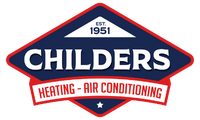What Causes Poor Indoor Air Quality?

As the spring season sets in, many are enjoying the warmer weather and sunshine. The days are getting longer, flowers are blooming, and grass is growing. While the spring brings many enjoyable things, it also causes allergies and poor indoor air quality. Your home should be an escape from the pollen outdoors, but dust and other allergens can trigger allergy symptoms as well. At Childers Heating and Air Conditioning, we specialize in indoor air quality in Gaffney, SC and surrounding areas and strive to help our customers breathe clean air inside their homes. In this blog, we discuss what causes poor indoor air quality and how to decrease allergens inside your home to keep you breathing easy.
What Is Indoor Air Quality?
Your heating and cooling unit not only produces comfortable temperatures for your home, but strives to distribute clean air as well. Indoor air quality (IAQ) is the quality of air inside your home or other buildings and can affect the health and comfort of those breathing the air. Many factors contribute to the quality of air in your home, such as air pollutants and humidity. Understanding what causes poor air quality and taking steps to improve IAQ can help minimize the negative affects the pollutants can have on your body and health. While poor IAQ can impose health concerns for all, it can greatly affect those who struggle with respiratory issues such as asthma.
What Is Causing Allergies Inside My Home?
We spend a large amount of our time inside our homes, which is why the air we breathe should be clean rather than full of pollutants. Due to blooming flowers and excess pollen in the spring, many struggle with uncomfortable allergy symptoms such as runny noses and sore throats. While your home may not have many outdoor allergens, it has many other pollutants contributing to poor indoor air quality. Below we have listed five potential triggers that could be causing allergy symptoms in your home.
- Mold & Mildew
- Pets
- Dust
- Chemicals
- Smoke
Mold & Mildew
Humidity remains fairly high in the spring and summer months in Gaffney, South Carolina. While some humidity is necessary for your home, too much humidity can have negative effects. Humidity should remain between 30-50% to maintain health and protect personal items. One negative effect of high humidity inside your home is mold and mildew growth. Mold and mildew thrive in moist and humid environments and can cause health concerns if growing inside your home. If you are experiencing uncomfortable allergy symptoms, we recommend identifying humidity levels, checking for mold, and installing a dehumidifier.
Pets
While we love our furry friends, did you know that they could be the cause of poor indoor air quality? Pets are one of the most common triggers of allergy symptoms, because of their hair. Pet dander can clog air filters and make it harder for the filter pores to catch other harmful pollutants. We recommend keeping your animals well groomed and investing in an air purifier for your home.
Related Article: The Impacts Animals Have On Indoor Air Quality
Dust
Dust collects inside homes and is a mixture of many particles that triggers allergy symptoms for some. However, dust mites are insect-like pests that live in house dust and are often the cause of many resident’s allergies. Much like mold, dust mites thrive in moist and humid environments. To reduce dust and dust mites, we recommend keeping a clean home with low humidity levels.
Chemicals
It is important to be aware of what cleaning products are used inside your home, because it could be the cause of allergy symptoms. Chemicals can include household cleaners, perfumes, or other fragrance products. After spraying, the chemical lingers in the air and results in poor air quality. We recommend noting the chemicals that seem to flare allergy symptoms and discarding the product immediately.
Smoke
Cigarette smoke is a common cause of allergies and health symptoms, which is why it is recommended to not smoke inside. Smoke can become trapped inside your indoor air and distribute throughout your home for hours. If you or someone in your home smokes, it is important for them to do so outside to maintain positive indoor air quality.
How To Improve Indoor Air Quality
We are here to help you and other residents in your home breathe easy each season. Your home should be a comfortable oasis from the allergens outdoors, which is why it is important to maintain good indoor air quality. Below we have listed four ways to improve indoor air quality in Gaffney, SC and surrounding areas.
- Regularly Change Air Filters
- Clean Ductwork
- Control Humidity
- Invest In An Air Purifier
Regularly Change Air Filters
Maintaining clean air filters is one of the easiest and most cost effective ways to improve indoor air quality. Your home has many air filters all working to catch allergens from entering the air you breathe. If the filter is clogged, it struggles to catch each pollutant that passes by and results in poor air quality. Additionally, we recommend purchasing high minimum efficiency reporting value (MERV) air filters. MERV measures how effectively a filter can catch particles that pass through. The higher the MERV, the smaller the filter pores and the more allergens it can catch. We recommend purchasing filters between 8-10 MERV. Higher MERV air filters are typically used for buildings such as hospitals.
Clean Ductwork
When your heating and cooling unit produces air, it likely distributes the air into your home through ductwork. Allergens such as dust can settle inside your air ducts, which can be picked up each time air is distributed. It is important to have clean air ducts to maintain good indoor air quality, and our expert technicians can help! At Childers Heating and Air Conditioning, we provide air duct cleaning services in Gaffney, SC and surrounding areas to help homeowners breathe clean air. Give us a call to schedule your appointment today!
Control Humidity
Your home needs humidity to maintain a comfortable and healthy environment. Like most things, too much or too little humidity can have negative effects on your home and health. Specifically, high and low humidity can cause allergy-like symptoms and cause discomfort. As we mentioned, homes should maintain 30-50% humidity and can be controlled by a dehumidifying or humidifying system. Typically, homes in Gaffney utilize dehumidifiers in the spring and summer months and humidifiers in the fall and winter months. Give us a call to learn more or install a whole home humidifier or dehumidifier in Gaffney, SC!
Invest In An Air Purifier
Air purifiers are beneficial home devices that work to improve indoor air quality. An air purifier’s main job is to remove contaminants in the air causing allergy symptoms. By removing airborne pollutants, you can breathe easier inside your home this allergy season. Give us a call to learn more about installing an air purifier for your home in Gaffney!
Warmer weather is on the horizon, and it is our responsibility to keep you breathing clean air! Let a Childers technician help improve your home’s indoor air quality this spring and keep your allergy symptoms to a minimum. Give us a call for indoor air quality services in Gaffney, SC and surrounding areas!
